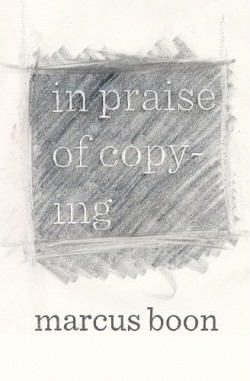Free .pdf of complete text | Chapter 1 excerpt at PopMatters
My second full length book, In Praise of Copying, was published by Harvard University Press in Fall 2010.
The book is devoted to a deceptively simple but original argument: that copying is an essential part of being human, that the ability to copy is worthy of celebration, and that, without recognizing how integral copying is to being human, we cannot understand ourselves or the world we live in.
In spite of the laws, stigmas, and anxieties attached to it, the word “copying” permeates contemporary culture, shaping discourse on issues from hip hop to digitization to gender reassignment, and is particularly crucial in legal debates concerning intellectual property and copyright. Yet as a philosophical concept, copying remains poorly understood. Working comparatively across cultures and times, I undertake an examination of what this word means—historically, culturally, philosophically—and why it fills us with fear and fascination. I argue that the dominant legal-political structures that define copying today obscure much broader processes of imitation that have constituted human communities for ages and continue to shape various subcultures today.
Drawing on contemporary art, music and film, the history of aesthetics, critical theory, and Buddhist philosophy and practice, In Praise of Copying seeks to show how and why copying works, what the sources of its power are, and the political stakes of renegotiating the way we value copying in the age of globalization.
Select Praise for In Praise of Copying
“Too important, and too ambitious, to ignore…” — Jess Row, The New Republic
“In some ways the disarming modesty and accessibility of Boon’s prose—something of a rarity in contemporary scholarship in the humanities that issues from academic presses—disguises its profound ambition. In Praise of Copying ranges widely in its interests and seriously and knowledgeably invokes the Western metaphysical tradition, contemporary post-structuralist theory, and the tradition of Mahayana Buddhism to suggest that commonplace distinctions between ‘genuine’ and ‘fake’ or ‘original’ and ‘copy’ compromise rather than enable a comprehensive and responsible understanding of ourselves and the world around us.” — James Williams, PopMatters
“A rich and contextual history of copying—with philosophical, etymological, and even biological threads…” — Jane Kim, Colombia Journalism Review
“Boon tries to challenge the very basic notions about copying, by analyzing it across time, culture and philosophy – making the reader rediscover itself and the world she lives in. He sees copying not as a limitation, but as an immense power waiting to be appreciated.” Alex Lungu, Copy-Me’s Top Ten Books on Copyright.
Reviews
- Sam Mowe, Tricycle
- Miriam Cosic, The Australian
- Jane Kim, Colombia Journalism Review
- James Williams, PopMatters
- Bradley Winterton, Taipei Times
- Amy Ione, Leonardo
- David Banash, Postmodern Culture
- Mark Fisher, The Wire
- Jess Row, The New Republic
- Elena Maceviciute, Information Research
- Péter Kristóf Makai, Americana
- Carl Wilson, Back To The World
Articles
- Jenny Hendrix, Page-Turner, the literary blog of The New Yorker
- Tom Barlett, The Chronicle of Higher Education
- Rainer Hank, Frankfurter Allgemeine
Interviews
- John Dankosky, Where We Live (WNPR)
- Sook-Yin Lee, Definitely Not The Opera (CBC Radio 1)
- Rorotoko
- DJ/Rupture, Mudd Up! (WFMU)
